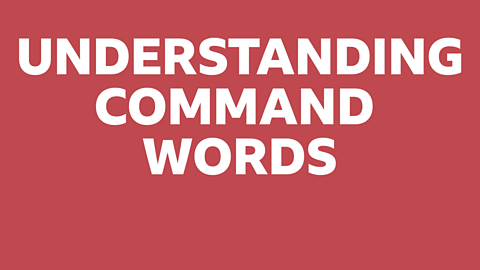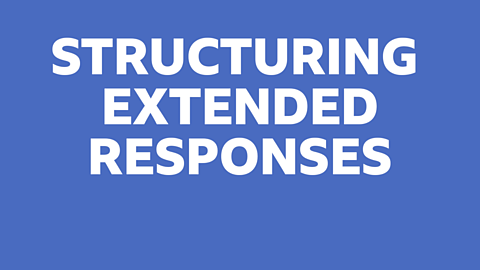A lot of our time revising is spent learning facts, figures and information from textbooks, online sources or our revision notes. What if we were to give you some tools and techniques to make understanding and remembering that information much easier? Hold on to your hats as we're about to give you a whirlwind guide on how to study for success.
In this video, our exam veterans talk through their top five tips for studying, and the ways you can work smarter to maximise your learning. If you prefer, you can scroll down to read the tips.
Daachi: I've got some expert advice on how to study for success in your exams.
Amiga: Let's hear it.
Daachi: Study tip number one. Create study notes that are clear and concise.
Amy: I was told by my teachers to make sure I was really clear and concise when I was creating my study notes because that makes it easier to come back later and revisit what you've written.
Amiga: The most important thing for me was to create notes that I knew I could read and access and to be active in my note-taking.
Dylan: My teachers always made sure that I was including key information in my notes so I wouldn't be making them up later. Like keywords, dates and names. Didn't like remembering dates.
Amy: Neither did I.
Daachi: OK, next tip.
Amiga: Design your notes so they are colourful and easy to follow.
Amy: Colours and highlighters were really important in my revision. I know for me I had like a highlighting system. So it was the orange was like I really don't know this I need to know this information and then there was the pink that was like, OK I sort of know this. And then there's the green. That was like I've got this I don't need to look back at it but maybe I might.
Dylan: Sometimes with highlighting less is more. I remember in a few of my English mocks, I highlighted so much that there was actually nothing that wasn't highlighted.
Amy: You're not the only one. I think it's time to stop when every other word is highlighted.
Amiga: There are loads of ways to make your notes colourful and easy to follow. So it's worth experimenting to find what works best for you. Mind-maps worked really well for me by using different colours, but some of my friends revised best with highlighted bullet points.
Dylan: OK, next tip.
Amy: Structure when you make your notes.
Daachi: There were definitely times where I wish I'd gone home and created my notes straight after the class rather than waiting ages and trying to remember everything we'd been taught. Definitely a good idea to avoid stress later in the year.
Amiga: How often did you make notes during the year?
Daachi: Well, I did it little and often and it didn't feel like I was doing too much at the time, but it helped in the long run and it also made exam time a lot less stressful. Our teachers also suggested that we listen out for changes in topics in their lessons and then note these down as headings, it really helped to structure my notes for those classes where I remembered to do it.
Amy: Next.
Dylan: Create a study timetable. I think that's really important because it really helps you visualise and understand what you're gonna do. And what you need to do more of.
Amy: Yeah, I think having a timetable and a schedule I think was like you can do work, but also giving yourself a break and scheduling you have this time to just relax and not overflow your brain with information. So I think having that bit of planning going I'm gonna do this and then I'm going to stop and I'm gonna do something else that's more fun that I want to do is it's really important.
Daachi: Creating a study plan was unbelievably helpful for me. I just took a normal calendar and instead of birthdays and parties it had subjects and topics on specific days to keep me on track.
Amiga: I was advised by one of my teachers to divide how long we had left until our exam by how many subjects we were studying rather than cramming it into one night. Don't forget to keep seeing friends and doing other hobbies. It's super important to keep time for this too.
Daachi: OK, last tip.
Amiga: Ask critical questions Like who. What. Where. Why. And when.
Amy: Who. What. Where. Why. And when. This was one of the best revision tips we were given at school and it meant we were actively recalling information that we were taught rather than just trying to memorise things from a textbook.
Daachi: Once I remembered the order the 5 w's were in iit made revision much easier.
Amiga: You gotta make sure they're in the right order, though. I got them confused the first few times. It's not the end of the world, but it didn't quite have the same effect.
Daachi: As soon as I was shown this method and I tried it out it instantly gave me a better understanding of the situation and context. It doesn't work for all subjects but the ones that it does work for such as history and geography it's a game changer. Not so much in maths.
Amiga: I agree.
Dylan: To study better make sure that your revision notes are clear and concise, colourful and easy to follow. Create a calendar of when you're going to do them. And remember the five w's if you want to make your life even easier. Don't forget to build in time for a social life, too.

Five tips to help you study better
Here are five top tips to help you study a little bit smarter when revising. These tips can make a big difference to the way you study and could make your workload more manageable as you prepare for exams.
Create clear study notes If you make your study notes clear and concise, they'll be easier to understand when you revisit them during your revision. Make sure you include keywords, dates and names in your notes and think about how you like to structure them. When we reflect on the way we learn and what works best for us, we're using metacognition. You can find out more about that here.
Design colourful and easy-to-follow notes Highlighting your notes will help make the main points stand out. You could use a system where you colour code things that you know, things that could use some more practice, or things you need to spend a lot of time on. There are loads of different ways to structure your notes with, or without, colour – you could use mind-maps or flashcards – but make sure you use the method that works best for you.
Structure when you make your notes Taking time to make your notes during, or straight after, class may seem like a lot of work, but it's usually better to take notes down whilst they're fresh in your mind. This will help avoid stress later on in the year. Keeping on top of your notes – doing little and often – will make them feel more manageable and avoid a backlog of work at the end of the year. Check out this guide on how to space our your studying.
Create a study timetable Having a timetable for your revision will help you manage your time better. We've got a template you can use to create a study plan. You could divide how long you have left until your exams by how many subjects you are studying – this will give you a rough idea as to how much time you can spend revising – but don't forget to include time for fun things, like hobbies and seeing friends. Take a look at this video for some tips from our Mind Set coaches about how to plan your time in the run up to exams.
Ask critical questions Remember the five W's – Who, What, Where, Why, When. Once you start asking these questions, you will get a better understanding of the situation and context. This method doesn't work for all subjects, but it's a game changer for subjects like history or geography.

If you want some more useful exam tips and guidance, then we've got loads of amazing advice to help guide you through exam season on the pages below, what are you waiting for? Give them a tap!

If you need support
You should always tell someone about the things you’re worried about. You can tell a friend, parent, guardian, teacher, or another trusted adult. If you're struggling with your mental health, going to your GP can be a good place to start to find help. Your GP can let you know what support is available to you, suggest different types of treatment and offer regular check-ups to see how you’re doing.
If you’re in need of in-the-moment support you can contact Childline, where you can speak to a counsellor. Their lines are open 24 hours a day, 7 days a week.
There are more links to helpful organisations on BBC Action Line.

3 tips to understand command words
Our exam veterans outline the importance of using command words, and show how you can use them to boss your exams.

5-point-plan for structuring extended responses
Knowing how to structure an extended response can help you stay on track whilst writing an essay or longer answers in an exam. We've asked our exam veterans to talk us through some of their favourite methods for structuring extended responses.

5 tips for checking online sources
We've asked our exam survivors for their advice when checking the validity of an online source when doing coursework.
